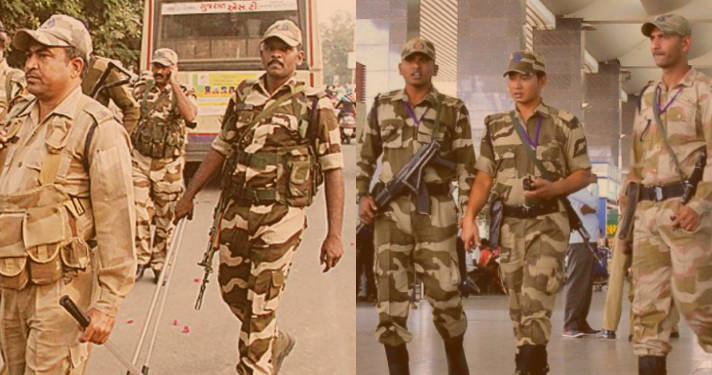In a disastrous step that would only ignite the conflict all the more rather bring an end to the ongoing feud between Indian Police Service and Paramilitary cadre officers, the union government has decided that Non Functional Financial Upgradation (NFFU) grant can not be granted to Paramilitary cadre officers. Instead, the Ministry of Home Affairs (MHA) issued an Office Memorandum on Tuesday, stating that the NFFU would be granted to officers of the central police forces when they complete 23 years in service, which is not the case with other Group –A services like IPS, IRS, IFS among others. The Central Armed Police Forces (CAPF) includes the Central Reserve Police Force (CRPF), the Central Industrial Security Force (CISF), the Border Security Force (BSF), the Sashastra Seema Bal (SSB), Assam Rifles (AR), the Indo-Tibetan Border Police (ITBP) and the National Security Guard (NSG).
Implementing NFFU would have helped increase the motivation level of the women and men in uniform operating in difficult and trying circumstances. This development clearly indicates the reluctance of IPS officers and their lobby to implement the court orders in letter and spirit as they are coaxing the government to steer away from the SC’s February judgment.
NFFU was introduced on the recommendation of the 6th Central Pay Commission with effect from 01-01-2006 to offset the financial loss for lack of promotional avenues in various Government services. NFFU implies that whenever an IAS officer gets empanelled at a particular appointment at the Centre, all other Group-A service officers are also upgraded to the same level after a period of two years from the date of empanelment, on a non-functional basis, irrespective of whether they are actually promoted or not. For example, if an officer of the IAS of 1989 batch is empanelled as an Additional Secretary to Govt of India, then all other Organised Group-A officers of the 1987 batch shall also be placed in the ‘Additional Secretary to Government of India’ pay grade (Higher Administrative Grade/HAG). As a result, almost all organised Group-A civil sevrice officers are retiring with the pay and pension of much higher grades than the functional grades actually held by them.
In August, the Supreme Court had asked the government to expedite the process of granting better pay benefits to central police forces and complete the process within two months, but nothing happened on the ground, albeit the Modi-government is now delaying the process by seeking a two-month extension till November 30 to implement the apex court’s February 2019 order, which had granted CAPF officers Organised Group A Service (OGAS) status bringing them at par with officials from IAS, IPS, IRS, and other central services.
The central police officers have been left puzzled after the government’s new order which seems like a blatant violation of SC’s order and many of them took to twitter to vent their anger and demand what is rightfully theirs.
https://twitter.com/TanikanSingh/status/1178751661528907776
@PMO @HMO
सुप्रीम कोर्ट के आदेश के बावजूद OGAS, NFFU,NFSG के मामले में CAPF कार्मिकों के साथ दोयम दर्जे का व्यवहार राष्ट्रवादी सरकार से अनापेक्षित था. दोयम दर्जे के नागरिक को PPMG,पराक्रम समेत दर्ज़न भर मैडलस धारण करने का कोई हक नही बनता,अतैव इन्हें मैं वापस करना चाहता हूँ।आदर— G P Singh (@gpsinghppmg) October 2, 2019
SC’s statement in the February 2019 ruling “Grant of status of Group ‘A’ Central Services to RPF (Railway Protection Force) shall not affect (the deputation of) the IPS.” is being used by IPS officers to interpret that their deputation will continue in the CAPFs despite the grant of organised service status to these forces. Since the order says that the deputation of IPS will continue in the RPF, the IPS officers believe that the omission of the word CAPF in the judgment is “a human error” , but RPF does not fall under the CAPFs and hence it is common sense that the court order is only limited to the RPF. It is a classic case of picking up a loophole and twisting the law for your own benefit.
The SC had given a rap to the Indian Police Service Association (IPSA) when it dismissed a plea filed by IPSA against the High Court decision which was submitted on the pretext that the vacancies of the IPS officers on deputation with the CAPFs would be curtailed if the said forces are treated as organised services. Declining the applications filed by the IPS Association, the Court had observed that there is no effect of the High Court decision on the posts of the IPS (on deputation).
The IPS officials do not want the authority to lead the CAPF’s be stripped away because as of now each CAPF is headed by IPS officers, much to the frustration and dismay of CAPF’s own cadres. Even other positions like the additional DG, inspector-general and deputy IG are mostly reserved for IPS officers and consequently, the IPS lobby is trying hard to thwart the implementation of the court order.
It is high time that the government fixes the muddle created by their own misadventures otherwise the outcome would be disastrous if the government still looked the other way while the wounds of CAPF fester.


























